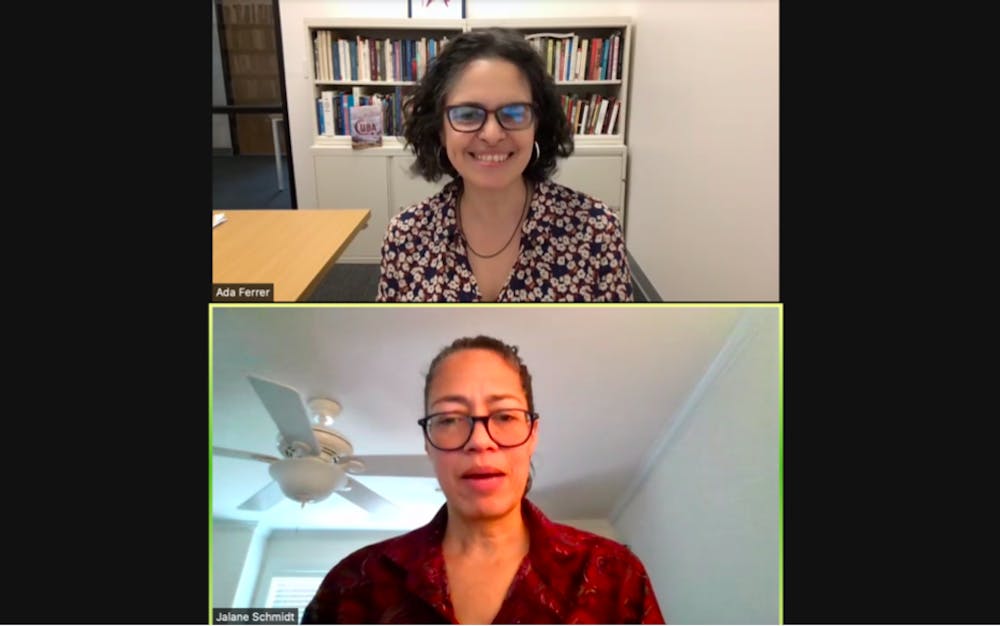The University’s Democracy Initiative hosted Ada Ferrer, Julius Silver Professor of Latin America and Caribbean History at New York University, to discuss the publication of her most recent book in a virtual discussion Monday from 12 p.m. to 1:30 p.m.
The event was part of the Democracy Initiative’s Touchstones of Democracy series, which focuses on key figures and periods in global history to deepen understanding of democracy today. All three events are available to community members who register through the Democracy Initiative’s website. The first conversation centered around the role that Renaissance humanism has played in democracy and the next event will focus on the democratic contributions of 18th century philosopher Edmund Burke.
The College and Graduate School of Arts & Sciences and the Miller Center founded the Democracy Initiative in 2018 with the goal of engaging a diverse range of audiences to study and advance democracy throughout the world. Since its founding, the Democracy Initiative has provided a forum for students and leaders to reflect on critical questions about the state of democracy.
Published in early September, Ferrer’s book consolidates more than 30 years of research in Cuban, Spanish and U.S. archives with the aim of assembling a detailed examination of over 500 years of Cuban history.
Jalane Schmidt, director of the Democracy Initiative’s Memory Project and associate professor of religious studies, moderated the discussion. Schmidt began by prompting Ferrer to explain the intention behind the title of her book — “Cuba: An American History” — which characterizes Ferrer’s writing as not only a history of Cuba, but also as an American history.
For Ferrer, the title accounts for the influence exerted by the U.S. on Cuba, but also represents a “selective, necessarily complete history” of the U.S. seen from the Cuban perspective.
“The U.S. has exerted enormous power in different parts of the world,” Ferrer said. “So to study a place where that power has been so manifested and constant means you are also studying American history.”
Ferrer also noted the ambiguity of the title, which could suggest a narrative of the diplomatic history between the U.S. and Cuba, a history of Cuba in relation to the U.S. or a reference to Latin America in general. Despite the common use of the word “America” to describe the U.S., “America” does not inherently refer to the United States, Ferrer added.
“The word America does not belong just to the U.S., right?” Ferrer said. “That’s also what drew me to the title – that if the reader comes in not quite sure, their assumptions [are] on hold, suspended.”
The discussion then turned to an extensive examination of José Martí’s experience as a Cuban revolutionary and immigrant to the U.S., his vision for post-independence Cuba.
José Martí was an essayist and poet born to Spanish parents in Havana in 1853. After becoming involved in the fight for Cuban independence from Spain, Martí had to leave Cuba and eventually moved to New York City, where he wrote for a Latin American newspaper, began his own Pro-Independence Newspaper and founded the Cuban Revolutionary Party. His essays are famous for their descriptions of both Martí’s visions for a Cuban democracy and of his perspectives of life in the U.S. as an immigrant.
“He’s just an incredibly important figure for Cuban history that many Americans aren’t aware of,” Ferrer said.
Schmidt and Ferrer underscored the simultaneous fight for Cuban independence from Spanish colonial rule and fight for racial equality and freedom for previously enslaved persons in Cuba in a roughly thirty year period between the late 1860s and 1890s. Slavery was abolished in Cuba in 1886 through a royal decree and the 1898 Treaty of Paris marked the end of the Spanish-American War included provisions forcing Spain to cede all claims to Cuba and officially concretized Cuban independence.
Black Cubans fought alongside white Cubans for Cuban independence. According to Ferrer, Martí deviated during this struggle from more traditional beliefs that a fight for Cuban independence would run the risk of leading to a racial revolution.
“[His point was] it’s actually the opposite — part of what makes, what will make, Cuba a worthy republic is that white Cubans and Black Cubans fought together for Cuban independence,” Ferrer said.“So he extolled this vision of a Cuban nationality that was built on a foundation of racial equality.”
Ferrer noted that Martí’s experience of living in the U.S. during the Jim Crow era likely influenced his explicit advocacy for racial equality. The Jim Crow era began in the U.S. in the 1870s and was characterized by both informal intimidation techniques and legal discrimination that disenfranchised and segregated Black individuals.
“Living in the U.S. in the 1880s and early 1890s, where he saw racial violence and racial segregation ... [helped] him see the value of a different kind of a model that he [hoped could] take root in Cuba,” said Ferrer.
At the end of the event, Schmidt directed the conversation to the future and asked Ferrer to consider what individuals in the U.S. can learn from Martí. In response, Ferrer emphasized Martí’s belief that racial equality is necessary for a democracy to be successful.
“I think that too, that American democracy it's not only just this insular thing,” Ferrer said. “You have to think about it in relation to immigrants and in relation to the outside world and the way the outside world interacts with the U.S. and vice versa.”
The Democracy Initiative will host the next event in this series, Edmund Burke and Democracy, Nov. 10.







